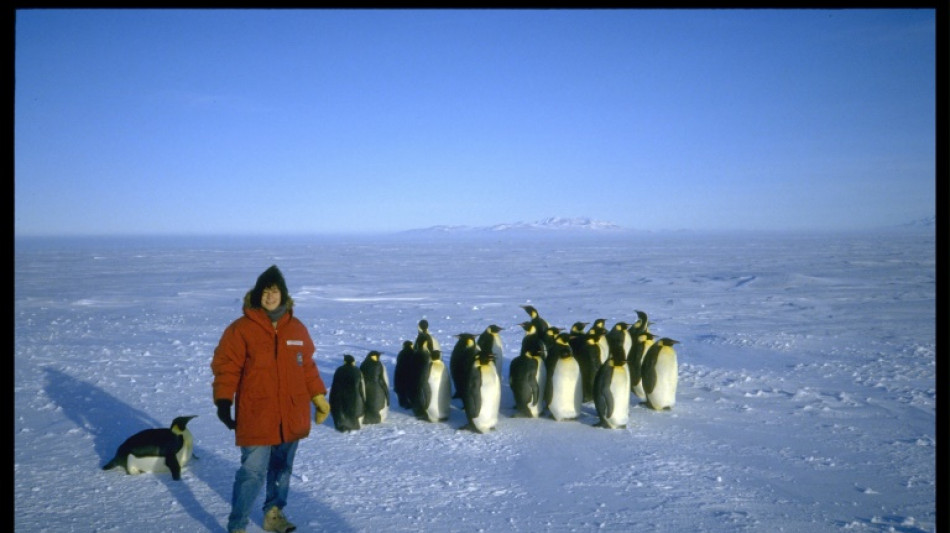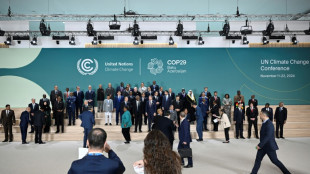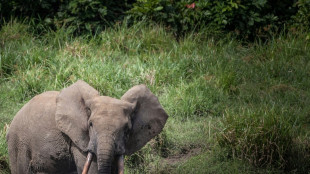
-
 Andy Murray to coach Novak Djokovic
Andy Murray to coach Novak Djokovic
-
Leipzig lose ground on Bayern, Dortmund and Leverkusen win

-
 Fear in central Beirut district hit by Israeli strikes
Fear in central Beirut district hit by Israeli strikes
-
Chinese film about Covid-19 wins Taiwan's top Golden Horse prizes

-
 Tuipulotu puts anger behind him as he captains Scotland against native Australia
Tuipulotu puts anger behind him as he captains Scotland against native Australia
-
Inter smash Verona to take Serie A lead

-
 Mass rape trial sparks demonstrations across France
Mass rape trial sparks demonstrations across France
-
Lebanon says 15 killed in Israeli strike on central Beirut

-
 Eddie Jones will revel in winding up England - Genge
Eddie Jones will revel in winding up England - Genge
-
Chelsea see off Leicester on Maresca's King Power return

-
 Storms bring chaos to Ireland, France, UK
Storms bring chaos to Ireland, France, UK
-
Berrettini gives Italy edge on Australia in Davis Cup semis

-
 Amber Glenn storms to gold in Cup of China
Amber Glenn storms to gold in Cup of China
-
High-flying Chelsea see off Leicester

-
 Climate-threatened nations stage protest at COP29 over contentious deal
Climate-threatened nations stage protest at COP29 over contentious deal
-
Families fleeing after 32 killed in new sectarian violence in Pakistan

-
 Ancelotti says 'ugly' to speculate about Mbappe mental health
Ancelotti says 'ugly' to speculate about Mbappe mental health
-
Failure haunts UN environment conferences

-
 Colapinto in doubt for Las Vegas GP after crashing
Colapinto in doubt for Las Vegas GP after crashing
-
Lebanon says 11 killed in Israeli strike on central Beirut

-
 Three arrested in Spain for racist abuse at Liga Clasico
Three arrested in Spain for racist abuse at Liga Clasico
-
Pope to skip Notre Dame opening for Corsica visit

-
 Tokyo police care for lost umbrellas, keys, flying squirrels
Tokyo police care for lost umbrellas, keys, flying squirrels
-
Neuville closes in on world title after Rally Japan recovery

-
 Jaiswal slams unbeaten 90 as India seize control against Australia
Jaiswal slams unbeaten 90 as India seize control against Australia
-
'Nice surprise' for Verstappen to edge Norris in Las Vegas GP qualifying

-
 Indian teen admits to 'some nerves' in bid for world chess crown
Indian teen admits to 'some nerves' in bid for world chess crown
-
Patrick Reed shoots rare 59 to make Hong Kong Open history

-
 Record-breaker Kane hits back after England criticism
Record-breaker Kane hits back after England criticism
-
Cameron Smith jumps into lead at Australian PGA Championship

-
 Russell on pole position at Las Vegas GP, Verstappen ahead of Norris
Russell on pole position at Las Vegas GP, Verstappen ahead of Norris
-
Philippine VP made 'active threat' on Marcos' life: palace

-
 Celtics labor to win over Wizards, Warriors into Cup quarters
Celtics labor to win over Wizards, Warriors into Cup quarters
-
Balkans women stage ancient Greek play to condemn women's suffering in war

-
 Nvidia CEO says will balance compliance and tech advances under Trump
Nvidia CEO says will balance compliance and tech advances under Trump
-
Grand Slam ambition dawning for Australia against Scotland

-
 Japan game set to leave England with more questions than answers
Japan game set to leave England with more questions than answers
-
Amorim's to-do list to make Man Utd great again

-
 What forcing Google to sell Chrome could mean
What forcing Google to sell Chrome could mean
-
Fears for Gaza hospitals as fuel and aid run low

-
 Anderson to Starc: Five up for grabs in IPL player auction
Anderson to Starc: Five up for grabs in IPL player auction
-
Big money as Saudi makes foray into cricket with IPL auction

-
 Budget, debt: Trump's Treasury chief faces urgent challenges
Budget, debt: Trump's Treasury chief faces urgent challenges
-
Trump names hedge fund manager Scott Bessent as Treasury chief

-
 Putin vows more tests of nuke-capable missile fired at Ukraine
Putin vows more tests of nuke-capable missile fired at Ukraine
-
Yin avoids penalty to keep lead as Korda charges at LPGA Tour Championship

-
 With favourites out MLS playoffs promise more upsets
With favourites out MLS playoffs promise more upsets
-
Trump to name hedge fund manager Scott Bessent as Treasury chief: US media

-
 Guardiola says 75 percent of Premier League clubs want Man City relegated
Guardiola says 75 percent of Premier League clubs want Man City relegated
-
'Unique' Netherlands beat Germany to reach first Davis Cup final


Leading ozone scientist says more climate surprises likely
Susan Solomon, a leading scientist in the fight to tackle the Antarctic ozone hole, says people are now getting worried enough to spur climate action.
The former expert for the UN's Intergovernmental Panel on Climate Change said the organisation's final instalment of a major series of reports, released Monday, would not be the "last word" on warming.
IPCC warned that climate change impacts are hitting faster than expected and the key 1.5 degree-Celsius warming limit could be reached in the early 2030s.
Solomon, a professor at MIT, said in an interview that more surprises were likely in store.
Her own research had delivered a recent "shocker" that Australia's massive 2019-20 wildfires combined with lingering remnants of the chlorofluorocarbons (CFCs) still in the atmosphere to erode the ozone layer -- Earth's protective shield from damaging ultraviolet radiation.
The following interview has been edited for length and flow:
Q: Did it feel like a crisis when the ozone hole was discovered?
A: It was a huge moment. The only thing you could compare it to would be if a piece of Greenland suddenly fell off into the sea and people were waiting for the three metres of sea level rise to show up on their doorstep.
All of a sudden you had 50 percent less ozone over Antarctica at certain times of year. And we did not know why.
I was 29 years old when the British Antarctic Survey discovered the ozone hole in 1985.
In 1986, I led the national ozone expedition to Antarctica. We made measurements of everything that we could think of: ozone itself, but also chlorine monoxide, chlorine dioxide, all of the ozone eating molecules and we were able to show that they were completely out of whack.
My idea was that maybe the reason this was happening was because of polar stratospheric clouds and surface chemistry. That turned out to be right.
Q: The Montreal Protocol (phasing out CFCs and other ozone depleting molecules) was signed in 1987. What enabled governments to act so quickly?
A: Three P's -- It was personal to people, because skin cancer and cataracts are scary. And it was perceptible because you could see these dramatic images on TV. It could easily be explained. And practical solutions were found pretty quickly.
Had we not stopped making these molecules, you would have massive ozone depletion worldwide. Overall, it has been a remarkable science, policy, and public success story.
Q: Why has climate change not had the same urgency?
A: People are beginning to get concerned enough about climate change, particularly the young. That is a tremendous spur to politicians.
The biggest problem is that people believe the solutions are not practical, but it's not at all true. People have to recognise how much more it's going to cost us if we don't do anything.
It's also too easy to tie climate change up with the culture wars, or whatever your social issue of the moment is.
We didn't have that with the ozone.
I was once in an IPCC meeting about chlorofluorocarbons with a delegate from a Middle Eastern country that produces a lot of oil. I asked him if his government had any concerns and he said: "No, we don't really care what's in the air conditioner, as long as it makes it cold".
The chemical companies could make other compounds. The problem with the fossil fuel companies is they're not going to be the ones to make solar panels.
Q: What are the key unanswered questions on climate change?
A: There's a lot of work going on now on understanding how storm tracks are going to change. Are we going to have more extreme Arctic air cold snaps? It might not be the issue you expected, but it's an issue.
Melting of the polar ice sheets -- how fast is that going to happen? There's a lot of uncertainty. It affects people on coastlines and island states all around the world.
The impact on the food and water supply -- there are open questions on both.
Things that involve the crossover between biology and physics are often the most difficult to understand. There's a 30 percent decline in the insect population worldwide going on right now. We really don't know why.
It's a great time to be a climate scientist, but on the other hand, it seems to me that every year something important and scary is happening.
O.Bulka--BTB


